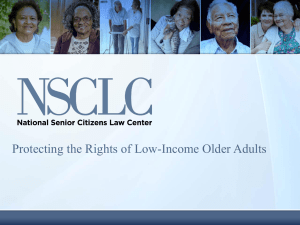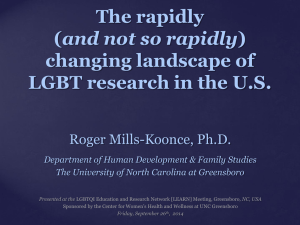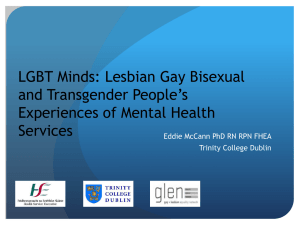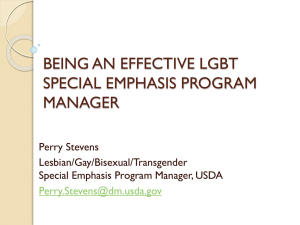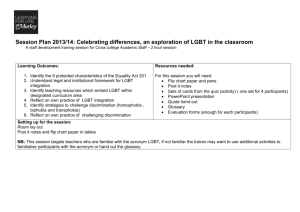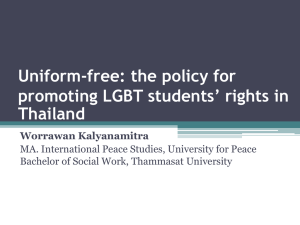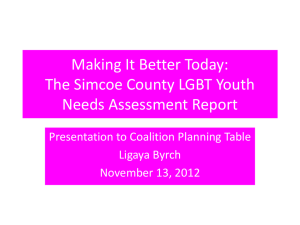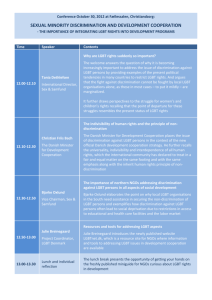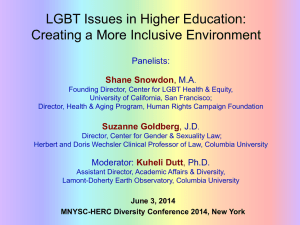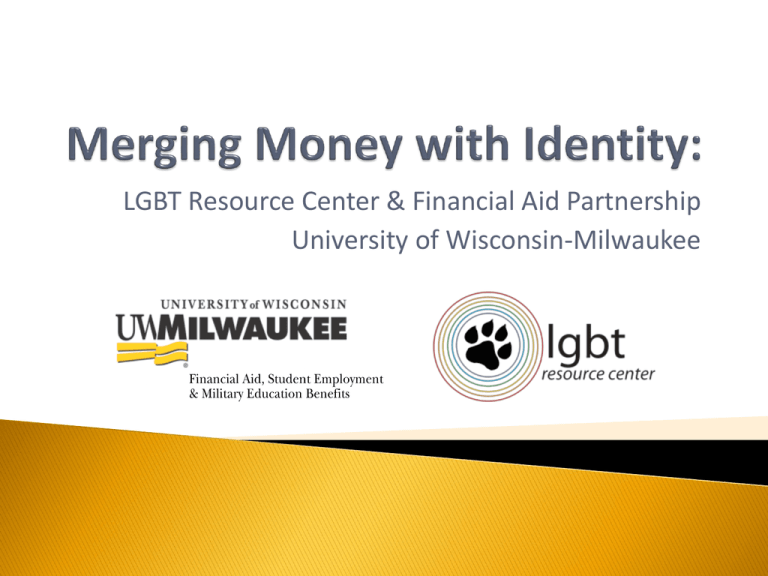
LGBT Resource Center & Financial Aid Partnership
University of Wisconsin-Milwaukee
Jennifer Murray
Pronouns in use: they, their, them & she, her, hers
Director, LGBT Resource Center
University of Wisconsin-Milwaukee
jrmurray@uwm.edu
Casey Calhoun
Pronouns in use: she, her, hers
Graduate Assistant Advisor, Financial Aid Department
University of Wisconsin-Milwaukee
ccalhoun@uwm.edu
◦ LGBT+ basics
Terminology Activity
◦ Intersection of Financial Aid regulations
and LGBT+ identities
◦ Ally Development
◦ Scenarios & Discussion/Q&A
◦ Wrap-Up with Final thoughts and resources
ProjectQ Presentation
◦ Youth development program that provides support,
programming and resources to and with LGBTQ youth
and their straight allies, ages 13-24.
Sparked a desire and need for increased training
& awareness in our own staff
We want to share!
Ultimately, increased awareness can lead to:
◦ More informed advisors
◦ More comfortable students
◦ Better services provided
Behavior
Identity
Orientation
Borrowed from: Dr. David Seal, Dr. Gary Hollander, Warren Scherer
MCW MSM population study
Pronoun
Identity
Expression
Developed by: Warren Scherer & Jay Botsford
Based on Sexual BIO and Gender PIE
Phone etiquette
Triggers
Self-Disclosure
◦ Small Changes in the Classroom
◦ https://www.insidehighered.com/advice/2014/09/19/simpleclassroom-change-make-trans-students-feel-home-essay
Forms
Change software to enable students to indicate the pronouns/preferred
names they use for themselves that would appear on course and grade rosters
and advisor lists.
Ideally, institutions should only ask about gender identity. But recognizing, for
example, that many women’s colleges currently limit enrollment to women
whose documents identify them as such, it may still be necessary to ask “sex”
on admissions forms. In such cases, both “sex” (“female” and “male”) and
“gender identity” should be asked.
◦ Critically examine if asking gender on a document is really needed. For example, is gender
identity relevant to a student’s participation in a career center event?
Enable students to self-identify their gender on forms. Suggested wording:
Gender Identity: ____________________________
◦ or, when such an open-ended question is not possible:
Gender Identity (choose all that apply)
__ woman
__ man
__ trans* or transgender (please specify): ______________
__ another identity (please specify): _________________
Suggested Best Practices for Supporting Trans* Students
Consortium of Higher Education LGBT Resource Professionals, June 2014
www.lgbtcampus.org
Defense of Marriage Act
◦ Prohibited recognition outside this definition:
"the word 'marriage' means only a legal union between one man
and one woman as husband and wife, and the word 'spouse'
refers only to a person of the opposite sex who is a husband or a
wife."
In United States v. Windsor (2013), the Supreme Court
held that Section 3 of DOMA is unconstitutional
because it violates the principles of due process and
equal protection.
“Place of Celebration” Rule
◦ For both a student and to the parents of a dependent
student.
Even for an institution located in a state that does
not recognize same-sex marriage
Relevant to all questions concerning marriage and
marital status on the FAFSA.
Parents might:
Use money/FAFSA information as a manipulator
Disown children & refuse to provide information
Kick student out of home
◦ In 2009, 23% of homeless youth surveyed in Milwaukee
identified as LGBT
◦ Nationally, 20-40% of all homeless youth identify as LGBT
LGBT Homeless Youth: Results of a 2009 Pilot Study of Seven Milwaukee Agencies
(2009). Center for Urban Initiatives and Research University of WisconsinMilwaukee.
Homelessness and Dependency Overrides
◦ We ask for circumstances and letters of support
Grades drop due to stress
◦ Now in for a SAP appeal and we are asking for documentation
What does this mean for the student?
◦ Forced self disclosure to advisor
◦ May have struggled through situation alone, now left without
any documentation
◦ Explaining situation once can be difficult, writing it out and
gathering documentation can be even more difficult
Name Change
◦ FAFSA
◦ Student Information System
◦ Phone call etiquette
Cost of New
Documentation
◦ Driver’s License
◦ Birth Certificate
◦ Social Security Card
Other items to consider:
◦ Selective Service
Registration
◦ Athletes & Scholarships
◦ The Cost of Transitioning &
Paying for School
Increase Awareness & Knowledge
Have Compassion
Review your office created documents for
non-inclusive language or presumptions
Empathize rather than sympathize
Bottom Line: Remember a student is a whole person
Ally Development
Ally development is a ongoing process
There are times when people fail to provide active
support and times when people succeed in providing
active support
Serve as a bridge to resources
Duke University Study on Failed/Active Support and Allyhood
Prevent Allyhood
◦
◦
◦
◦
◦
◦
◦
Silence
Not confronting homophobia/transphobia (jokes, comments)
Fear of negative response
Own phobias
Uncomfortable with LGBT+ identities yourself
Fear of being labeled LGBT+
Lack of general knowledge
Duke University Study on Failed/Active Support and Allyhood
Promote Allyhood
◦
◦
◦
◦
◦
◦
◦
◦
◦
◦
◦
Provide an inclusive environment
Speak out; be politically active
Coming out publicly in support of LGBT+ people
Social/religious/other organizations
Speaking out in other areas of membership
Intervention
Confront homophobia, demeaning remarks, language
Personal education
Supporting LGBT people
When coming out, dealing w/ family or relationship issues
Attend activities/events
1.
Maria calls into the Financial Aid office. Maria is a returning
sophomore student, and is calling because they need help
filling out FAFSA in order to receive additional financial aid to
return to school. Maria stays on their own and stated they do
not have any relationship with their parents and they are
unable to receive information.
2.
Tracy is a current undergraduate student athlete who began
college with a full ride scholarship. Tracy is currently
transitioning FTM and using hormonal replacement therapy.
Tracy is required to take one year off from playing sports
during his transition and he plans to return to play on the
men’s team. He will still be attending the university as a
student during his year off from athletics. He wants to know
how this will affect his scholarship funding since he was
initially funded because he played sports.
3.
Sam comes into the Financial Aid saying zie needs to
speak with someone about maximizing zir financial aid.
You state you can assist zir with this and you investigate
zir situation further. Sam has funded zir education
through grants and paying out of pocket. Sam is
transitioning and planning to pay for surgical procedures.
Sam is looking to maximize zir funding for school so zie
can afford both. Sam is now in your office asking about
additional aid and scholarship resources.
4.
Major is a student who recently moved from out of state
to attend UWM. Major is 22 and married. However
Major’s marriage is not recognized in the state of
Wisconsin. How will this impact Major’s FAFSA filing?
5.
An 18 year old student who has been disowned by
parents and has no means of getting their parents’
financial information. Does this change if the student
is homeless? What if their parents just refuse to
provide the information?
6.
A student calls the Financial Aid office asking about
scholarships for individuals for LGBT+ identified
individuals. What information can you tell them? If
you don’t know of any, how can you find out?
Human Rights Campaign Scholarship Database
◦ http://www.hrc.org/scholarship-database/
FinAid LGBT+ Scholarships
◦ http://www.finaid.org/otheraid/lgbt.phtml
Point Foundation
◦ http://www.pointfoundation.org/
7.
What may be some barriers for students who identify
within the LGBT+ in receiving services from financial
aid?
8.
What do you believe are the experiences of LGBT+
persons when interacting with financial aid office?
9.
How many students do you serve identify as LGBT+
or how many do these situations like homelessness,
being disowned, income loss, loss of insurance by
parents apply?
10.
All male students must be registered for selective
service to receive federal aid. What if a student is
biologically male but identifies as female?
11.
When we call students in for appointments, what
name do you use? What happens when the student
doesn't go by that name anymore?
Thank You!!!


